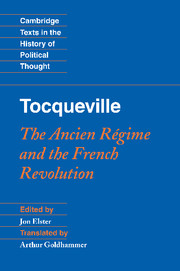Book contents
- Frontmatter
- Contents
- Introduction
- Bibliographical Note
- Chronology
- TOCQUEVILLE: THE ANCIEN RÉGIME AND THE FRENCH REVOLUTION
- Foreword
- Book I
- Book II
- II.1 Why Feudal Prerogatives Had Become More Odious to the People in France Than Anywhere Else
- II.2 Why Administrative Centralization Is an Institution of the Ancien Régime and Not, As Some Say, the Work of the Revolution or Empire
- II.3 How What Today Is Called Administrative Tutelage Is an Institution of the Ancien Régime
- II.4 How Administrative Justice and the Immunity of Public Officials Were Institutions of the Ancien Régime
- II.5 How Centralization Was Thus Able to Insinuate Itself among the Old Powers and Supplant Them Without Destroying Them
- II.6 On Administrative Mores under the Ancien Régime
- II.7 How France, of All the Countries of Europe, Was Already the One in Which the Capital Had Achieved the Greatest Preponderance over the Provinces and Most Fully Subsumed the Entire Country
- II.8 That France Was the Country Where People Had Become Most Alike
- II.9 How Men So Similar Were More Separate Than Ever, Divided into Small Groups Alien and Indifferent to One Another
- II.10 How the Destruction of Political Liberty and the Separation of Classes Caused Nearly All the Maladies That Proved Fatal to the Ancien Régime
- II.11 On the Kind of Liberty to Be Found under the Ancien Régime and Its Influence on the Revolution
- II.12 How, Despite the Progress of Civilization, the Condition of the French Peasant Was Sometimes Worse in the Eighteenth Century Than It Had Been in the Thirteenth
- Book III
- Appendix: On the Pays d'états, and in Particular Languedoc
- Notes
- Index
- CAMBRIDGE TEXTS IN THE HISTORY OF POLITICAL THOUGHT
II.11 - On the Kind of Liberty to Be Found under the Ancien Régime and Its Influence on the Revolution
Published online by Cambridge University Press: 05 June 2012
- Frontmatter
- Contents
- Introduction
- Bibliographical Note
- Chronology
- TOCQUEVILLE: THE ANCIEN RÉGIME AND THE FRENCH REVOLUTION
- Foreword
- Book I
- Book II
- II.1 Why Feudal Prerogatives Had Become More Odious to the People in France Than Anywhere Else
- II.2 Why Administrative Centralization Is an Institution of the Ancien Régime and Not, As Some Say, the Work of the Revolution or Empire
- II.3 How What Today Is Called Administrative Tutelage Is an Institution of the Ancien Régime
- II.4 How Administrative Justice and the Immunity of Public Officials Were Institutions of the Ancien Régime
- II.5 How Centralization Was Thus Able to Insinuate Itself among the Old Powers and Supplant Them Without Destroying Them
- II.6 On Administrative Mores under the Ancien Régime
- II.7 How France, of All the Countries of Europe, Was Already the One in Which the Capital Had Achieved the Greatest Preponderance over the Provinces and Most Fully Subsumed the Entire Country
- II.8 That France Was the Country Where People Had Become Most Alike
- II.9 How Men So Similar Were More Separate Than Ever, Divided into Small Groups Alien and Indifferent to One Another
- II.10 How the Destruction of Political Liberty and the Separation of Classes Caused Nearly All the Maladies That Proved Fatal to the Ancien Régime
- II.11 On the Kind of Liberty to Be Found under the Ancien Régime and Its Influence on the Revolution
- II.12 How, Despite the Progress of Civilization, the Condition of the French Peasant Was Sometimes Worse in the Eighteenth Century Than It Had Been in the Thirteenth
- Book III
- Appendix: On the Pays d'états, and in Particular Languedoc
- Notes
- Index
- CAMBRIDGE TEXTS IN THE HISTORY OF POLITICAL THOUGHT
Summary
If the reader were to stop reading this book now, he would come away with a highly imperfect image of the government of the Ancien Régime and a poor understanding of the society that made the Revolution.
Having seen citizens so divided and withdrawn into themselves and a monarchical government so extensive and powerful, he might think that the spirit of independence had disappeared along with all public liberties and that all the French were equally acquiescent in their subjection. This was not the case at all, however. The government had already achieved sole and absolute control of all common affairs, but it was still a long way from being the master of every individual.
In the midst of many institutions already prepared for absolute power, liberty lived, but it was a singular sort of liberty, which is difficult to grasp today and which must be examined closely if we wish to understand the good and evil it may have done to us.
While the central government supplanted all local powers and increasingly filled the entire sphere of public authority, certain institutions that it had either allowed to survive or itself created, along with old customs, ancient mores, and even abuses, impeded its movements, sustained a spirit of resistance in the minds of many, and left intact the resolve and firmness in the character of countless individuals.
- Type
- Chapter
- Information
- Tocqueville: The Ancien Régime and the French Revolution , pp. 102 - 111Publisher: Cambridge University PressPrint publication year: 2011

